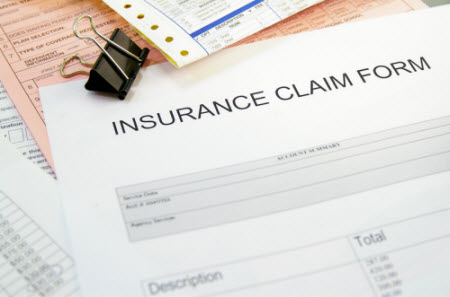7 claims mistakes people make after a major insured loss

When a devastating event like a fire or flood strikes, there is often little time to prepare. In the panic to evacuate, people are often forced to abandon cherished belongings in the interest of personal safety. The result is that many are literally faced with rebuilding their lives from the ground up once the dust settles.
Insurance is there to help those people recover from disaster. But making a claim after a major event can be highly emotional. Driven by a desperate need to get life back to normal, policyholders may make costly mistakes in the claims process. Here are seven of the biggest mistakes to avoid:
1. Not being familiar with your insurance policy
Instead of waiting until a worst case scenario, take the time to sit down with your broker now to understand to what degree your belongings are covered. Some things may be covered for replacement value, and some may not be covered at all. Sentimental value doesn’t always equate to cash value.
Do your homework so you aren’t taken by surprise. For example, protection against certain disasters like earthquakes and floods (if you don’t live in a flood plain) may require an additional clause[1]. Be aware that it takes roughly 30 days for the additional insurance clause to kick in from the time of purchase[2].
2. Not having a clear picture of your possessions
While it does take time, having a comprehensive inventory of your possessions prior to a disaster will not only save you hours of frustration, it can also ensure that you receive enough coverage to replace what you lost.
Keep receipts and records, or take photos or video footage. Maintain records and paper copies in a safe deposit box or fireproof safe, and upload your digital files to cloud-based storage where they will be accessible even if your digital device is damaged[3].
3. Not keeping detailed allowance receipts and records
After a major disaster, insurance companies will provide allowances to help pay for living expenses and other emergency requirements while you are displaced from your home. Make sure you understand for what the allowance is intended. Buy a logbook to keep tight notes at every step. Get a pocket file folder to keep receipts for all your expenses.
Be aware that insurance companies are basing many of their initial payouts on projected timelines and losses. If they are projecting a six-week displacement, and you are back in your home after three weeks, you may be required to reimburse a portion of the initial payout. If, on the other hand, you are displaced longer, you may be entitled to more.
4. Rushing a claim
While it’s understandable that policyholders are anxious to get on with their lives, it’s easy to forget something if you make a claim in a hurry. If you don’t have an inventory of your possessions, take the time to build a solid list – go through it with every member of your household to identify any omissions. Walk through department stores, and take photos of items similar to what you had. Compile as much physical evidence as you can. Don’t rush into closing a claim or accepting final payment until you are sure that you have accounted for all your possessions.[4]
On the other hand, some companies have strict deadlines that you have to meet if you wish to file a claim[5]. Be mindful of this window to make sure you don’t miss your opportunity to be awarded full compensation.
5. Not keeping evidence
If you have been affected by a flood, you want to get rid of the water-damaged carpet as soon as possible. If your home has been damaged by fire, you’ll want to dispose of anything that has smoke damage. But don’t be too quick to toss out those damaged goods—they’re evidence your insurance company needs to properly assess the damage. If you can’t let it pile up without rotting, then take photographs to present to your adjuster[6].
6. Spending your claim too fast
An insurance payout can seem like a windfall. It’s tempting to treat yourself – especially after a traumatic event like the Fort McMurray fire. If you lost your entire home, you may be the recipient of a sizeable payout. The amount can seem overwhelming, but you will be surprised at how quickly you can spend it. It’s a good idea to make a budget before you start - and stick to it.
7. Selecting the wrong contractor
Sadly, after a disaster, many fraudulent contractors pop up hoping to make some quick money. Your insurance agent will have a list of trusted contractors. If you opt to select your own, make sure the contractor is reputable and capable of carrying out the scope of work you require.
Here are some steps you can take to make sure you’re dealing with a legitimate contractor or renovator:
o Get a statement and contract in writing
o Check references and research the company you’re hiring
o Never pay in cash[7]
o Never pay in advance
Mother Nature is unpredictable and capable of causing extreme damage to people’s homes and lives. Avoiding common insurance mistakes will help you and your family get your feet back on solid ground as quickly and smoothly as possible.
[1] https://www.nbc-insurance.ca/advices-benefits/natural-disasters.html
[2] http://www.bankrate.com/finance/insurance/flood-insurance-2.aspx
[3] http://adjustersinternational.com/common-mistakes-made-by-policyholders-following-a-property-loss/
[4] http://realestate.findlaw.com/owning-a-home/top-ten-tips-for-filing-fire-insurance-claims.html
[5] http://adjustersinternational.com/common-mistakes-made-by-policyholders-following-a-property-loss/
[6] http://www.alleghenyinsurance.com/2016/02/01/top-5-mistakes-made-filing-insurance-claims/
[7] http://www.ibc.ca/nl/home/home-fraud/restoration-vendor-fraud







